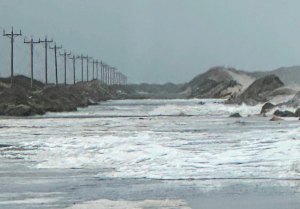Ocracoke Road is a Wash Out

Several recent nor'easters have caused overwash on Rte. 12 at the north end of Ocracoke.
"I've been studying the Outer Banks, the Atlantic Ocean, climate change, and geology for twenty years, and I did not see it coming," said Dr. Linus Highwater of the NC Ocean Research Institute in Sea Level, NC in a recent interview with the Current. "Who knew?"
Highwater says that his team of scientists remained confident in the safety and sustainability of the so-called "ribbon of sand" until just a few weeks ago.
"I mean, I saw the photos from Ocracoke and thought, 'Well, butter my butt and call me a biscuit, that's some crazy high water!' (no pun intended)," he said. "I mean, let's look at the best available science. The earth hasn't been this hot since the Pleistocene Era, and the polar ice sheet has been melting for decades, but there was ZERO reasons to expect that barrier islands with a geologic age of 10,000 years would be affected."
Due to the unpredictable nature of nature, the NCDOT and Cape Hatteras National Seashore have no choice but to close the road and shut down the ferries when wind picks up a bit, the tide is high, or the moon is full.
But hey, the weather is nice TODAY, so what's the big deal?
When pressed for his recommendations about repairs to the road or other future options for access to Ocracoke, Highwater suggested the Current contact Hyde County's official lobbyist, former NC state senator Bob Steinburg for more information.
Steinburg's job is to advocate for Hyde County's needs at the state legislature. He assured the Current that he had not broached the subject of climate change or sea level rise, saying, "I don't see what the problem is. But if there was a problem, it would be caused by DEI, CRT, and wokism."
Per the NC legislature's edict, state agencies can't look at current climate science to plan for NC's future. "We look to the past!" is the rallying cry of said agencies, who have the full backing of the coastal real estate industry.
As Dr. Highwater explained, "The way we've done things for the past 50-75 years is working just fiiiine. Roads and bridges built on naturally shifting sand are the only logical ways to get to islands, then and now."
"I have no idea why my ancestors used boats," said bridge enthusiast Wade Austin.
Editor's note: The Current tried to contact Dr. Orrin Pilkey for comment, but he could not be reached as he was too busy beating his head against a brick wall.



